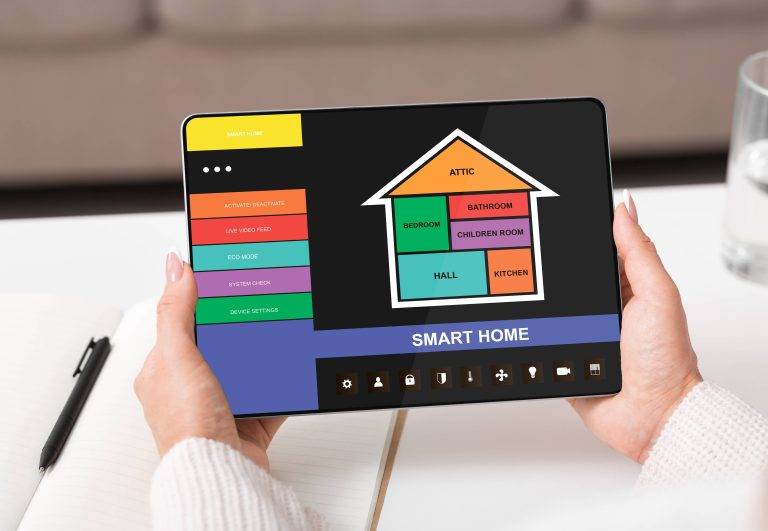
As we step into an era of unprecedented technological innovation, the concept of AI-powered smart homes is no longer a distant fantasy but an imminent reality. Smart homes are evolving beyond interconnected devices controlled by humans to autonomous systems powered by artificial intelligence. These advancements promise to revolutionize our daily lives, offering convenience, efficiency, security, and comfort in ways previously unimaginable. In this blog post, we will explore how AI-powered smart homes will transform daily life, setting the stage for a new standard of living.
The Rise of AI in Smart Homes
Artificial intelligence has rapidly infiltrated various sectors, from healthcare to finance, and now, smart home technology. AI’s ability to learn, adapt, and make decisions without human intervention sets it apart from the earlier generations of smart home devices. These intelligent systems create a seamless and intuitive environment that anticipates our needs, rather than merely responding to commands.
Seamless Automation and Integration
One of the most significant benefits of AI-powered smart homes is their ability to offer seamless automation. AI algorithms analyze patterns in residents’ daily routines, learning their preferences over time. Whether it’s adjusting the thermostat when you wake up, brewing your coffee just the way you like it, or dimming the lights at a particular hour, AI ensures that everything in your home operates harmoniously and without requiring manual input.
Enhanced Security
Security is a paramount concern for any homeowner, and AI has the potential to take smart home security to unparalleled levels. AI-powered security systems can recognize faces, identify unusual activities, and learn the difference between a real threat and a false alarm. For instance, smart cameras with AI capabilities can distinguish between a family member, a pet, and an intruder. They can alert homeowners in real-time if an unfamiliar face is detected, or automatically summon emergency services in the event of a break-in.
Voice-activated assistants, like Amazon’s Alexa or Google Assistant, are becoming more sophisticated, enabling users to lock doors, turn on security systems, or check camera feeds using voice commands. These assistants continue to improve through deep learning, making them ever more adept at understanding and executing complex instructions.
Energy Efficiency and Sustainability
Sustainability is no longer just a buzzword; it’s a necessity. AI-powered smart homes contribute significantly to energy efficiency and environmental conservation. AI systems optimize the use of electricity, heating, and water by learning the inhabitants’ habits and adjusting usage accordingly. For instance, smart thermostats can predict when a room will be occupied and adjust the temperature to save energy, while AI-driven lighting systems can control the brightness based on the time of day and activity in the house.
Furthermore, AI can integrate renewable energy sources, like solar panels, with home energy management systems. By predicting weather patterns and energy consumption rates, AI can store and distribute energy more effectively, reducing dependency on nonrenewable resources and lowering utility bills.
Personalized Living Experiences
One of the most captivating aspects of AI-powered smart homes is the tailored living experience they offer. AI learns individual preferences to create a highly personalized environment. Music systems play your favorite tunes when you arrive home, smart kitchens suggest recipes based on the ingredients you have, and home entertainment systems curate television shows and movies according to your viewing habits.
Moreover, AI can enhance health and wellness within the home. Smart mirrors can provide skin analysis and beauty tips, while smart scales monitor weight and offer fitness recommendations. For those with medical conditions, AI can monitor vital signs and remind users to take medications or even alert healthcare providers in case of abnormalities.
Challenges and Ethical Considerations
While the advantages of AI-powered smart homes are clear, several challenges and ethical considerations must be addressed. Privacy concerns are at the forefront, as AI systems collect vast amounts of data to function effectively. Ensuring this data is securely stored and not misused is critical. Transparency in how data is collected, used, and shared is vital for gaining user trust.
Additionally, the reliance on AI could lead to issues of dependency and reduced human interaction. Striking a balance between automation and human involvement will be crucial in preventing social isolation and maintaining essential life skills.
The Future Outlook
Despite these challenges, the future of AI-powered smart homes is incredibly promising. As technology continues to evolve, we can expect even more sophisticated and integrated systems. Innovations such as 5G connectivity will further enhance the capabilities of smart homes, providing faster and more reliable communication between devices.
In the coming years, we may see the emergence of fully autonomous smart homes that require minimal human intervention, offering unprecedented levels of comfort and convenience. These homes will not only cater to luxury markets but will also become increasingly accessible, improving living standards across various socioeconomic backgrounds.
Conclusion
AI-powered smart homes are set to transform daily life in remarkable ways. From enhanced security and energy efficiency to personalized living experiences, the potential benefits are vast. As we embrace this new era of innovation, it is essential to address the challenges and ethical considerations that come with it. By doing so, we can look forward to a future where our homes are not just smart but intelligent, making everyday life more convenient, secure, and enjoyable.
As a smart home blogger, it is exhilarating to witness and document these advancements. The journey towards fully AI-powered homes is just beginning, and the innovations we see today are only the tip of the iceberg. Stay tuned as we continue to explore the fascinating world of future smart home innovations and gadgets.







